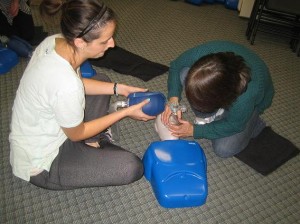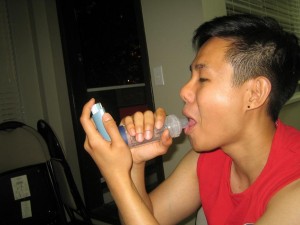
Grande Prairie First Aid is the most popular provider of basic first aid training in Grande Prairie, Alberta. Because of amazing rates, flexible schedules, and quality training courses, students have chosen Grande Prairie First Aid over other providers time and time again. Full courses, stand-alone classes, and private programs are available throughout the week, with recertification programs held twice a week.
Grande Prairie First Aid
Basic first aid courses

Training in basic first aid with Grande Prairie First Aid cover a variety of first aid topics, generally focusing on emergency situations and injuries requiring emergency first aid. Students are taught the basics of EMS (emergency medical services) and addressing different kinds of wounds and injuries that compromise circulation and respiration emergencies. CPR and AED training is also included in the program. AEDs or automated external defibrillators are machines that detect heart rhythms and apply needed shock to restart the heart. Participants will also learn to prevent circulatory emergencies by understanding cardiovascular diseases. Basic first aid programs last 14-16 hours long.
Register for a Course
To register for a St Mark James course in Grande Prairie, Alberta complete the following form:
We will respond to your inquiry / request within one business hour.
Stand-alone CPR classes
Stand-alone classes for CPR are also available, in three different levels. Level A and C are for first time first aid trainees. Level HCP is for health care professionals. Level C focuses on adult victims only while level C focuses on adult and pediatric victims. Level HCP is for basic life support in a hospital setting, teaching students how to use AED machines and bag valve masks.
Recertification programs
To pass a training program, the student is required to have complete attendance, 75 percent on the written exam, and adequate basic first aid skills. Once the program has been completed successfully, a certificate card is awarded to the students. Wall mount certificates are optional.
Because certificates expire in three years, recertification programs for their renewal are held twice a week. Recertification for basic first aid are 8 hours long, and include CPR level C recertification.
Private instruction
Grande Prairie First Aid offers private instructors for special training at home or for company events. All trainees are certified by St Mark James and have hourly rates so if you want to book an instructor, just send an e-mail or give a call.
Enrolment fees
Grande Prairie First Aid offers the most competitive fees for basic first aid training in Alberta. Fees are paid in full during enrolment so trainees don’t have to worry about extra expenses during the rest of the training period. Fees include taxes, certification, and St Mark James training manuals.
Students are also entitled to full refunds of the training course fees if they drop out, provided a 72-hour notice is given.
Prospective students can enrol through e-mail, telephone call, or walk-in during business hours.
Get an idea of what training will be like with the lesson below.
Did You Know?
Management of burns
- Cool the burn with cold clean water or normal saline – especially burns caused by chemicals. Avoid using ice water.
- Do not pull off any portion of the wound, even the tar-coloured skin.
- Blisters should not be popped.
- Non-adherent clothing on or near the wound should be removed carefully.
- Cover the areas with clean dressings.